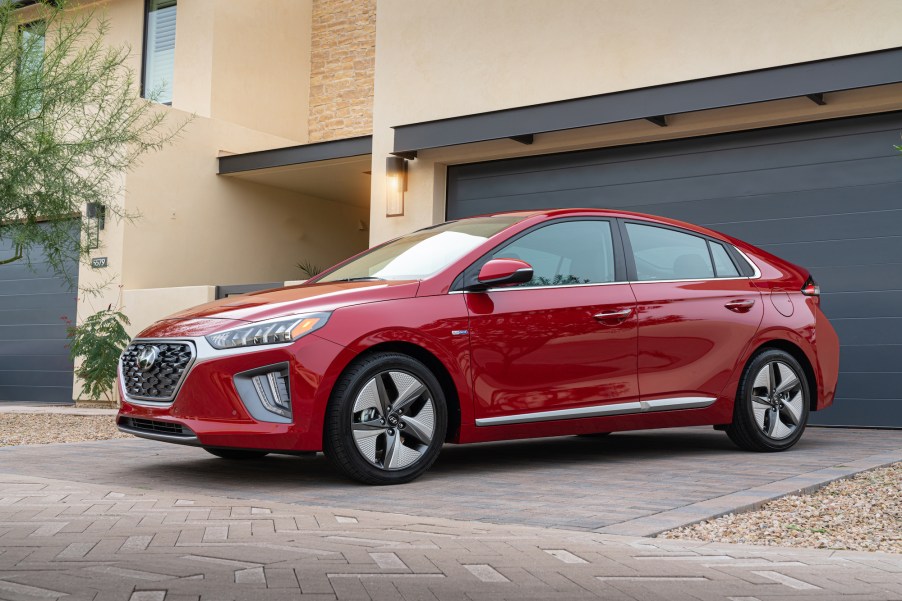
2020 Hyundai Ioniq vs. Toyota Prius: A Battle of the Fuel Sippers
In 1997, Toyota introduced the Prius, the first mass-produced hybrid. It became an instant success, and interest in electric vehicles was off and running.
Only a few decades later, most major auto manufacturers produce environmentally friendly versions of their cars. Hybrid and all-electric vehicles have become highly competitive in an ever-changing market.
The latest release comes from Hyundai. The upgraded 2020 Hyundai Ioniq goes head-to-head with the 2020 Toyota Prius for a piece of the hybrid pie.
A side-by-side comparison of the Hyundai Ioniq and Toyota Prius
The Ioniq is giving the Prius a run for its money. With updated styling, advanced technology, and improved safety features, the Ioniq offers buyers a new alternative.
Since its debut in 2017, the Hyundai Ioniq has upgraded its fuel efficiency to an EPA-estimated 58 mpg, according to Cars.com. A 170-mile range is an impressive increase from the 2019 model, capable of only 124 miles. The entry-level models at $24,175, and the Limited costs $32,175.
The 2020 Toyota Prius has an 11.3-gallon fuel tank that allows for an EPA-estimated 56 mpg combined. The starting MSRP is $25,320, which includes the $995 destination fee.
The Hyundai Ioniq boasts a 134-hp 1.6-liter engine paired with a 6-speed dual-clutch automatic. A 95-hp 1.8-liter engine with a 2-speed CVT powers the Prius. Going from 0 to 60 mph in 8.9 seconds, the Ioniq offers quicker acceleration than the Prius.
A unique feature of the Ioniq is a reset that recharges the 12-volt battery using the hybrid battery. But the all-wheel-drive variant in the Prius sets it apart from others in its class.
The impressive use of recycled plastic, powdered wood, and volcanic stone in the Hyundai interior surpasses the materials used in the Toyota. Both vehicles accommodate five passengers, with the 4-door Ioniq hatchback offering slightly more cargo space than the Prius.
The most fuel-efficient cars on the market
Fuel sippers are in high demand, and hybrid vehicles are now more stylish and roomier than ever. These affordable alternatives offer respectable performance and are making gas-guzzlers obsolete.
The Toyota Prius has led the fuel-efficiency market for decades. U.S. News included it on its list “10 Best Cars With the Best Gas Mileage in 2020.” The magazine gave the Prius an overall score of 7.9 out of 10.
With its 58 mpg combined rating, the 2020 Hyundai Ioniq took first place on the list. U.S. News gave the vehicle an 8.0 out of 10 overall. Other vehicles on the list are the Honda Insight and Accord and the Toyota Corolla, Camry, and Avalon.
Pros and cons of each vehicle
“The Ioniq hybrid’s updates don’t make it any more fun to drive, but they do help keep it relevant for drivers who want extraordinary efficiency in an ordinary package,” Car and Driver reported.
The 2020 Hyundai Ioniq excels with its 170-mile range and increased 134 hp. The class-leading fuel economy and new regenerative braking controls help the Ioniq stand out among competitors. Where the Ioniq lacks is its slow response time when in ECO mode and loss of efficiency in the sport mode, according to Car Buying Strategies. Its inability to handle rough terrain leaves for a bumpy and somewhat uncomfortable ride. The biggest problem with this attractive hybrid is that it is not yet available in all U.S. markets.
The environmentally friendly 2020 Toyota Prius gets a limited 25 miles on electric-only power, but with a full tank of gas, the hybrid can go 600 miles without refueling. The Toyota handles surprisingly better than vehicles in its class and offers a wide array of standard features. On the downside, the Prius’s overall performance is unimpressive. The interior uses cheap materials, and the exterior looks bland.
The Prius is backed by the longevity and reliability of the Toyota brand. Safety, comfort, technology, and versatility are a few reasons this classic hybrid is so popular, Car Buying Strategies reported. But the 2020 Hyundai Ioniq is a solid alternative to Toyota’s flagship hybrid.


